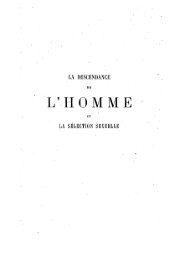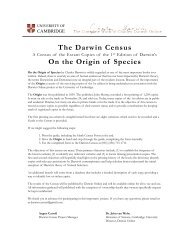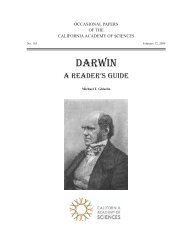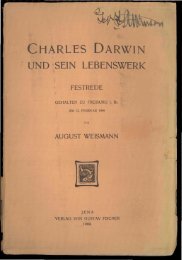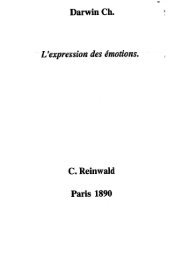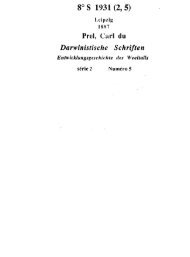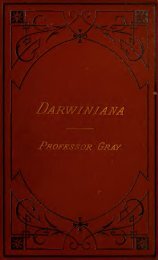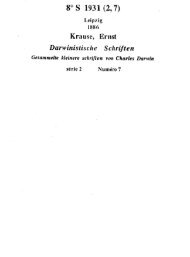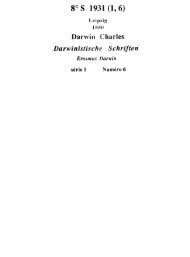Charles Darwin's Cambridge Life 1828-1831 - The Complete Work ...
Charles Darwin's Cambridge Life 1828-1831 - The Complete Work ...
Charles Darwin's Cambridge Life 1828-1831 - The Complete Work ...
Create successful ePaper yourself
Turn your PDF publications into a flip-book with our unique Google optimized e-Paper software.
Vol 4. No.4 December 2009 Journal of <strong>Cambridge</strong> Studies<br />
7<br />
College Lectures<br />
After breakfast in their rooms students were expected to attend the two College lectures in the<br />
lecture room, probably from 9-11am. In his Autobiography, p. 58, Darwin recalled “With respect to<br />
Classics I did nothing except attend a few compulsory college lectures, and the attendance was<br />
almost nominal.”<br />
After College lectures students might have tea or coffee in their rooms and were free to visit friends<br />
or go for walks. Around 1.00 it was customary to visit private tutors. Dinner was then at 4.00 in Hall.<br />
For Pensioners like Darwin the meal or commons provided consisted only of joints of meat and beer.<br />
However extras could be purchased such as vegetables, pies and cheese. In fact the College record<br />
book T.11.25 had a separate column for vegetables next to the record for commons. In <strong>1828</strong><br />
vegetables were charged at “5 ½ p/day”. In the first quarter of Darwin’s residence in <strong>Cambridge</strong> his<br />
vegetable bill came to £1 2s 5½d. (T.11.25)<br />
<strong>The</strong> Hall<br />
<strong>The</strong> Hall was the largest building in Christ’s College, and the place where members of the College<br />
gathered for dinner. <strong>The</strong> Hall today is quite different from its appearance in Darwin’s day. “In 1723<br />
money was given to “beautify” it: which was done by putting deal wainscot over the oak panelling,<br />
by covering up the old fireplace, and by hiding the roof with a cylindrical plaster ceiling.” It<br />
remained thus until 1875 when “the old roof was removed, reconstructed, and replaced; the walls<br />
were rebuilt and raised about 6 feet…and new oak panelling was put up, some of the original work<br />
being sufficiently sound to remain at the south end.” <strong>The</strong> panelling at the north end was added in<br />
1900. (Peile 1900, p. 31) In 1882 and in following years stained glass portraits were added to the<br />
Hall’s west oriel. Darwin is represented in the top right and final panel in his scarlet honorary LL.D.<br />
gown. <strong>The</strong> work was done by Messers. Burlison and Grylls. (Peile 1900 p. 16)<br />
Before the meal a Latin grace was read. <strong>The</strong> Fellows and Fellow Commoners ate a three course meal<br />
with port or sherry at their own table on a raised dais at the north end of the Hall. <strong>The</strong> Pensioners sat<br />
together at long tables at the south end of the Hall. <strong>The</strong> Sizars acted as waiters. After dinner the<br />
Fellows and Fellow Commoners would retire to the Combination Room located upstairs behind the<br />
gallery at the south end of the Hall. Here they would drink wine or port and converse until evening<br />
Chapel at 6pm.<br />
On 20 December <strong>1828</strong> Darwin arrived back in Shrewsbury with his new dog Dash. He visited<br />
friends and relatives in Shropshire and Staffordshire for shooting and visits. In a January 1829 letter<br />
to Fox Darwin made a rare reference to his College studies: “my Studies consist of Adam Smith &<br />
Locke, in the latter of which I suppose you are an adept, & I hope you properly admire it— About<br />
the little Go I am in doubt & tribulation. I have had very little shooting.” (Correspondence, vol. 1:<br />
74) <strong>The</strong> “little Go” was the nickname for the University’s Previous Examination, which<br />
undergraduates took in their second year. According to the <strong>Cambridge</strong> University Calendar, 1829, p.<br />
169, “<strong>The</strong> subjects of examination are one of the four Gospels or the Acts of the Apostles in the<br />
original Greek, Paley's Evidences of Christianity, one of the Greek and one of the Latin Classics”.<br />
Locke’s An essay concerning human understanding appeared in the B.A. examination for those who<br />
were not candidates for honours. <strong>The</strong> work by Adam Smith, probably his <strong>The</strong>ory of Moral<br />
Sentiments, did not appear in the Previous or B.A. Examinations. It may have been a reading<br />
assigned by his College Tutor or Lecturer. Before returning to <strong>Cambridge</strong> for Lent Term Darwin<br />
stayed with his brother in London.


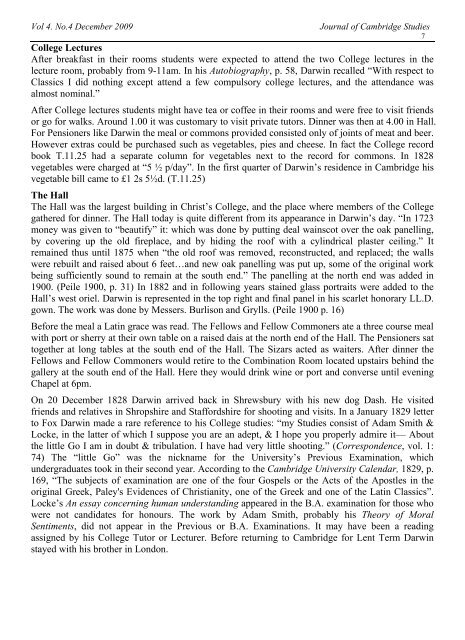
![[180] XXX. Notes on the Eflécts produced by 25720 Ancient Glaciers](https://img.yumpu.com/49145077/1/144x260/180-xxx-notes-on-the-eflects-produced-by-25720-ancient-glaciers.jpg?quality=85)
